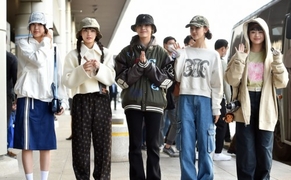 |
| Samsung Electronics Chairman Lee Jae-yong, Hyundai Motor Group Chairman Chung Eui-sun, and Hanwha Group Vice Chairman Kim Dong-kwan (from left) departed for Washington between July 28-30 to support Korea-U.S. trade negotiations, mobilizing private networks to aid the talks. / Source: Yonhap, Hanwha |
South Korea’s recent tariff agreement with the United States, which lowered mutual tariffs to 15%, was achieved through close collaboration between the government and major business leaders, hailed as a "symbol of public-private cooperation."
Samsung Electronics Chairman Lee Jae-yong, Hyundai Motor Group Chairman Chung Eui-sun, and Hanwha Group Vice Chairman Kim Dong-kwan traveled to Washington from July 28 to 30 to support the negotiation team. Their presence, leveraging corporate investments as bargaining chips, is credited with helping secure the tariff reduction. Trade Minister Yeo Han-koo highlighted the private sector’s role in mobilizing networks and sharing information during the talks.
One key element was the "MASGA Project"—adding "Shipbuilding" to Donald Trump’s "Make America Great Again" slogan. The $150 billion Korea-US shipbuilding cooperation fund was a major bargaining point, opening the previously closed U.S. shipbuilding market to Korean firms.
The deal eased a major source of uncertainty for exporters. The shipbuilding fund, backed by guarantees, will lower direct investment burdens and pave the way for Korean shipbuilders’ U.S. expansion. However, challenges remain, including high tariffs on steel and aluminum, and the lack of specifics for an additional ₩2 trillion investment package.
Hanwha pledged full participation in the MASGA Project, vowing to expand its U.S. Philly Shipyard and build new facilities. Business federations praised the agreement as a breakthrough enabling Korean firms to compete in the U.S. market under "equal or better conditions than other major countries."
The semiconductor sector welcomed Washington’s assurance of "most favored nation" treatment, with U.S. Commerce Secretary Howard Lutnick affirming that Korean semiconductors will not be "treated less favorably." Samsung said the deal reduced uncertainty but noted it was closely monitoring a pending U.S. Section 232 probe into semiconductors.
The Korea Semiconductor Industry Association said the agreement would expand business opportunities with U.S. partners, reinforcing the industry’s role as a "core national sector."
The Korea Automobile & Mobility Industry Association expressed relief over tariff clarity, urging swift implementation. Hyundai and Kia vowed to offset tariff impacts through "quality, branding, and technology innovation."
Steelmakers remain cautious, as steel tariffs were left unchanged at 50%. Industry officials said they plan to coordinate with the government for future negotiations, warning that high rates will continue to strain competitiveness in the second half of the year.
Most Read
-
1
-
2
-
3
-
4
-
5
-
6
-
7





















